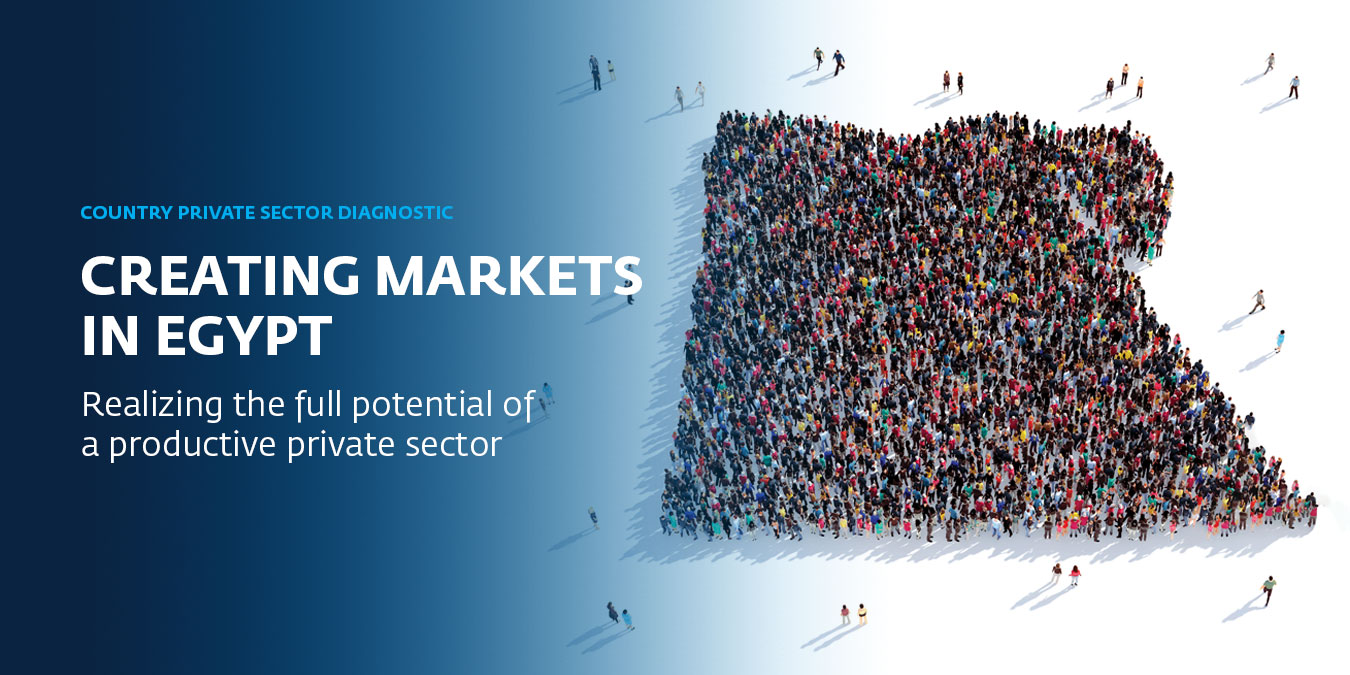
Cairo, Egypt, December 21, 2020 — Egypt could unleash economic growth and create more and better jobs by addressing constraints to private sector activity, according to a report published today by the World Bank Group.
The Egypt Country Private Sector Diagnostic (CPSD) takes an in-depth look at the private sector's role in Egypt and provides a roadmap for how the country can strengthen and diversify its economy.
The report identifies trade and logistics, the role of the state, and competition and commercial justice as critical areas in need of reform. It also examines constraints and opportunities for the development of strategic sectors, including agribusiness, manufacturing, technology, and others.
"The need for inclusive economic growth is more pertinent today than ever," said Egypt's Minister for International Cooperation, Dr. Rania A. Al-Mashat. "Egypt is committed to push for more private sector engagement to generate jobs that are broad-based across many sectors in the economy, which in return drive diversification and long-term sustainable development."
Walid Labadi, IFC Country Manager for Egypt, Libya, and Yemen, said, "In 2016, Egypt embarked on a reform journey that improved its macroeconomic stability and helped restore confidence in its economy, but more must be done to further reforms and unlock the full potential of the country's private sector. The CPSD provides the roadmap for how to do this."
The CPSD outlines how Egypt can boost growth by reforming its trade policies, modernizing its customs, and improving its transportation links. It also highlights the importance of ensuring a level playing field for state-owned and private sector economic actors, establishing a culture of greater transparency, and of improving the competition framework.
Marina Wes, World Bank Country Director for Egypt, Yemen & Djibouti, said, "Sustaining and building on Egypt's recent macroeconomic gains —especially in light of COVID-19— requires a second generation of reforms aimed at strengthening human capital, advancing the digital economy, and promoting private sector led growth. The CPSD launched today complements existing World Bank Group initiatives aimed at strengthening the private sector and enabling it to unlock its full potential including by creating jobs for Egypt's growing youth population."
IFC has invested and mobilized over $4 billion in Egypt over the past decade, including $400 million during the last fiscal year. IFC also provides advisory services support to Egypt's government and private enterprises to strengthen the country's private sector.
The World Bank's program in Egypt supports reforms that build Egypt's human capital, and improve its competitiveness and governance. The World Bank portfolio in Egypt comprises 13 projects with a total commitment of US$5.84 billion.
The Egypt CPSD can be downloaded here.
About the Country Private Sector Diagnostic (CPSD)
Launched in 2017 as a corporate priority, the World Bank Group's new Country Private Sector Diagnostic (CPSD) supports WBG strategic focus on expanding private investment and leveraging private solutions to address significant development challenges in client countries. The diagnostic assesses critical constraints to private sector engagement and identifies policy and regulatory reforms needed to unleash a private response, thereby laying the foundation for a more integrated approach that brings to bear private and public sector perspectives, expertise and solutions. The CPSD uses a structured approach to analyze key sectors with private sector potential, selecting those for deeper analysis where markets can be created or expanded in the near term. The sector assessments are conducted with expert input from within and without the World Bank Group, including government, local private sector, development partners and others to both ensure a comprehensive coverage of potential opportunities and identify required policy action to realize them. Jointly delivered by the WB and IFC, the value of the CPSD stems as much from its diagnostic rigor as it does from its consultative process and the focus on policy action. Policy recommendations on how to activate the private sector for development gains are a core component of the CPSD. It aligns with the World Bank Group's Maximizing Finance for Development (MFD) approach, which looks to private sector solutions to reach the 2030 Sustainable Development Goals.
About the World Bank Group
The World Bank Group plays a key role in the global effort to end extreme poverty and boost shared prosperity. It consists of five institutions: the World Bank, including the International Bank for Reconstruction and Development (IBRD) and the International Development Association (IDA); the International Finance Corporation (IFC); the Multilateral Investment Guarantee Agency (MIGA); and the International Centre for Settlement of Investment Disputes (ICSID). Working together in more than 100 countries, these institutions provide financing, advice, and other solutions that enable countries to address the most urgent challenges of development. For more information, please visit www.worldbank.org, www.miga.org, and www.ifc.org
Stay Connected
www.facebook.com/IFCwbg
www.twitter.com/IFC_org
www.youtube.com/IFCvideocasts
www.ifc.org/SocialMediaIndex
www.instagram.com\ifc_org
Contacts
Stay Informed
Sign up to have customizable news & updates sent to you.